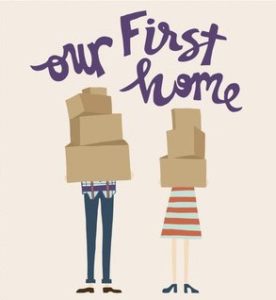 It’s a question so many Millennials have. I want to have a home for my family, but how can I afford to do that with student loan debt? It’s a tough question, but if you put a little work into it, you may find out that it is possible. My wife and I both have student loan debt, but we are also homeowners. When we found out our daughter Hazel was on the way, we decided that we wanted to move out of Manhattan and into the burbs so we could have a yard and good schools for her. It has been over one year now and we love it! It took some careful planning and some sacrifices, and we’re still a bit uncomfortable, but we did it. It is never easy figuring out how to balance your goals and the choice of buying a home vs paying down student debt (i.e. taking on even more debt vs paying down existing debt) is one of the big ones. Here are some steps you can take to give you some guidance to see if you are ready and can afford to buy a home.
It’s a question so many Millennials have. I want to have a home for my family, but how can I afford to do that with student loan debt? It’s a tough question, but if you put a little work into it, you may find out that it is possible. My wife and I both have student loan debt, but we are also homeowners. When we found out our daughter Hazel was on the way, we decided that we wanted to move out of Manhattan and into the burbs so we could have a yard and good schools for her. It has been over one year now and we love it! It took some careful planning and some sacrifices, and we’re still a bit uncomfortable, but we did it. It is never easy figuring out how to balance your goals and the choice of buying a home vs paying down student debt (i.e. taking on even more debt vs paying down existing debt) is one of the big ones. Here are some steps you can take to give you some guidance to see if you are ready and can afford to buy a home.
Step 1: What is your goal?
In this scenario, you have two goals: pay off student loan debt and buy a home. The first thing you need to ask yourself is how you feel about each? Does having student loan debt for decades scare you? Is owning a home the most important thing to you? Are you ok with carrying student loan debt for a long time if it’s in exchange for buying a house?
These are all things to think about before you even start down this path. If you decide that owning a home is a high priority, then quantify it by time and value. What will this home cost? How much money do I need for a down payment, closing costs, furnishings, etc.? When do I want to buy?
Your student loan debt kind of quantifies itself by time and value. Your loans have a term and a monthly expense to you so you know when they will be paid off and how much money you will need to do that.
Step 2: Work on Your Budget
Before you can figure out how to achieve your goal of buying a house, you need to figure out how much money you have available to put towards your goals. This requires looking at your budget carefully. Spend some time looking at the past 3 months and write out a budget. What’s left over after paying all the bills (rent, utilities, groceries, minimum student loan payments, etc.)? That’s now the number you have to work with and allocate towards your goals.
Don’t forget about a rainy-day fund though. Having a cash reserve of about 3-6 months of living expenses is very important. You need to have that savings tucked away in case an emergency arises. Once you have a cash reserve established, then you can see what is left over each month to put towards saving for that house. However, I know what you’re going to say, “How can I have both a cash reserve and a down payment for a house!?”. I hear you loud and clear. The reality is that most people use their rainy-day fund as an extension of their down payment because there’s only so much cash that you can save. For a lot of people another 3-6 months in cash on top of what they need for a home will result in never getting to actually buying a home on time. If this is you, just ask yourself, how much cash is too little cash (meaning you’d be too uncomfortable) to have in the bank after closing? Try not to go lower than that and then work on building your reserve back up.
Step 3: Take Action on Your Goals
Now that you know how much money is left over each month (if any- if not, see what you can change in that budget) it’s time to decide how much to save toward each goal. Go back to those numbers about your home goal. Let’s say you want to buy a $500,000 home in 3 years. To purchase this home, put 20% down and pay closing costs and some furnishings, you would need approximately $120,000. That means to have enough money in 3 years, you would need to save $3,333 per month.
How does that number compare to what you have left over each month? If it is more, then you may need to adjust your goal. If it’s less, then can you allocate some to paying more towards student loans or other goals? This is where you decide how much of what you have available to save goes toward which goal. Once you start saving, be sure to review your own progress every 6 months. Were you able to save what you said you would? Or did you take that vacation? If you really needed that vacation to recharge so you could go back to work and keep crushing it, then it was probably worth it. These are your goals. No one can tell you what is most important. You must do what is best for you.
If you want to learn more about how my wife Heather and I achieved our goal of home ownership or how to work with your student debt, be sure to grab a copy of The Millennial Money Fix. I could write for days about this topic and the book is just that.
Related Articles
[CNN Money] How can I pay off $175,000 in student loans and still have a life?
[CNN Money] How one grad cut her student loan debt by $20,000
